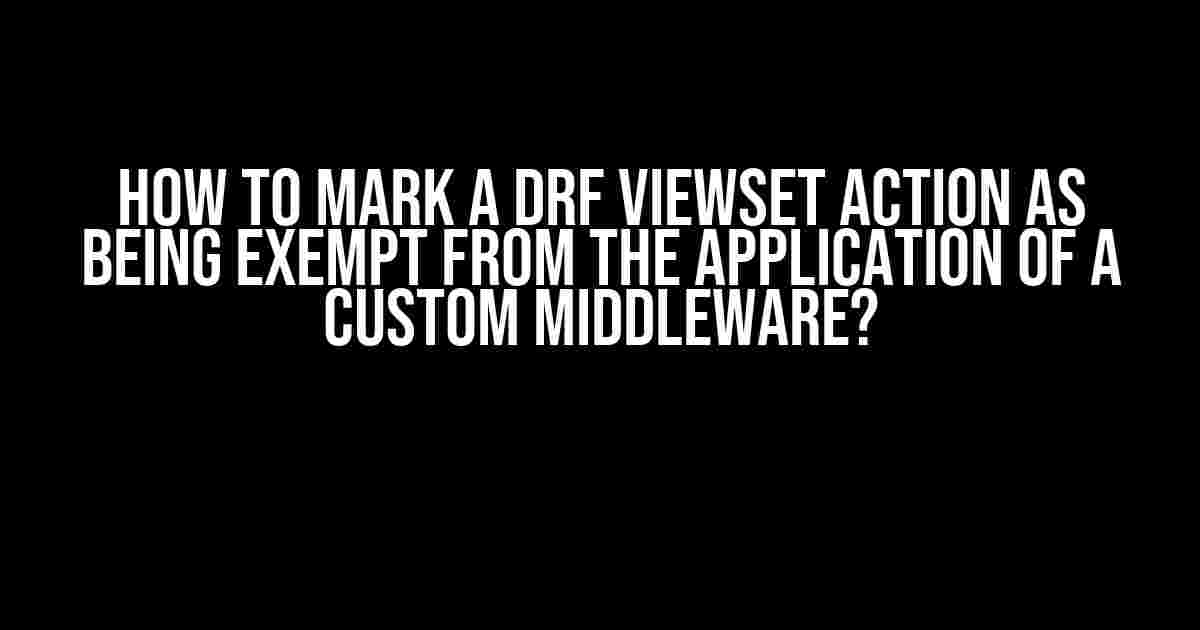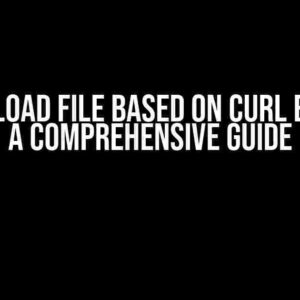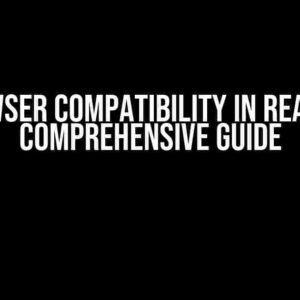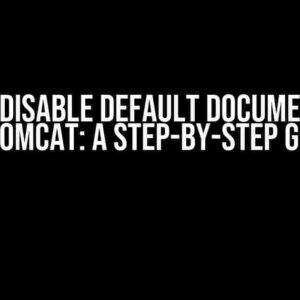Are you tired of struggling with custom middleware in your Django Rest Framework (DRF) project? Do you want to learn how to exempt specific ViewSet actions from the application of a custom middleware? Look no further! In this article, we’ll dive into the world of DRF middleware and explore the steps to mark a ViewSet action as exempt from a custom middleware.
What is a Custom Middleware?
A custom middleware is a Python function that sits between the client’s request and your DRF API. It allows you to perform custom logic, authentication, or caching before the request reaches your views. In other words, it’s a way to intercept and modify incoming requests or outgoing responses.
Here’s an example of a simple custom middleware that logs every incoming request:
class RequestLoggerMiddleware:
def __init__(self, get_response):
self.get_response = get_response
def __call__(self, request):
print(f"Request received: {request.method} {request.path}")
return self.get_response(request)
Why Exempt a ViewSet Action from a Custom Middleware?
There are scenarios where you might want to exempt a specific ViewSet action from a custom middleware. For instance:
- You have a custom middleware that applies rate limiting to all API requests, but you want to exempt a specific action, like the login view, from this rate limiting.
- You have a custom middleware that performs authentication, but you want to exempt a specific action, like the Swagger documentation view, from authentication.
- You have a custom middleware that caches responses, but you want to exempt a specific action, like a webhook receiver, from caching.
In these cases, you can mark the specific ViewSet action as exempt from the custom middleware, allowing it to bypass the middleware’s logic.
How to Mark a ViewSet Action as Exempt from a Custom Middleware?
DRF provides a built-in mechanism to exempt specific ViewSet actions from middleware using the `_exempt` attribute. Here’s how you can do it:
Step 1: Define the Custom Middleware
First, define your custom middleware as a Python function or class. In this example, we’ll create a middleware that logs every incoming request:
class RequestLoggerMiddleware:
def __init__(self, get_response):
self.get_response = get_response
def __call__(self, request):
print(f"Request received: {request.method} {request.path}")
return self.get_response(request)
Step 2: Add the Middleware to the DRF Settings
Add the custom middleware to the `MIDDLEWARE` setting in your DRF project’s settings file:
MIDDLEWARE = [
# ...
'path.to.RequestLoggerMiddleware',
# ...
]
Step 3: Create a ViewSet with an Exempt Action
Create a ViewSet with an action that you want to exempt from the custom middleware:
from rest_framework import viewsets
from rest_framework.response import Response
class MyViewSet(viewsets.ViewSet):
def list(self, request):
# This action will be exempt from the custom middleware
return Response({"message": "Hello, world!"})
def create(self, request):
# This action will not be exempt from the custom middleware
return Response({"message": "Resource created!"})
Step 4: Mark the Action as Exempt
Use the `@method_decorator` decorator to mark the `list` action as exempt from the custom middleware:
from rest_framework.decorators import method_decorator
from django.utils.decorators import decorator_from_middleware
my_middleware_exempt = decorator_from_middleware(RequestLoggerMiddleware)
class MyViewSet(viewsets.ViewSet):
@method_decorator(my_middleware_exempt, name='dispatch')
def list(self, request):
# This action will be exempt from the custom middleware
return Response({"message": "Hello, world!"})
def create(self, request):
# This action will not be exempt from the custom middleware
return Response({"message": "Resource created!"})
In this example, we’ve used the `decorator_from_middleware` function to create a decorator from our custom middleware. We’ve then applied this decorator to the `list` action using the `@method_decorator` syntax.
Conclusion
In this article, we’ve explored how to mark a DRF ViewSet action as exempt from a custom middleware. By using the `@method_decorator` decorator and the `decorator_from_middleware` function, you can bypass the custom middleware’s logic for specific actions.
Remember to use exemptions wisely, as they can potentially introduce security vulnerabilities or performance issues if not properly validated.
| Middleware | Exempt Actions |
|---|---|
| RequestLoggerMiddleware | list |
| RateLimiterMiddleware | login, logout |
| AuthenticationMiddleware | swagger, docs |
By following these steps, you can efficiently manage your custom middleware and ensure that specific ViewSet actions are exempt from their logic.
Frequently Asked Questions
Q: Can I exempt multiple actions from a custom middleware?
A: Yes, you can exempt multiple actions from a custom middleware by applying the decorator to each action separately.
Q: Can I exempt all actions from a custom middleware?
A: No, you cannot exempt all actions from a custom middleware using this approach. If you want to exempt all actions, you should not add the middleware to the `MIDDLEWARE` setting.
Q: Can I use this approach with function-based views?
A: Yes, you can use this approach with function-based views by decorating the view function with the `@my_middleware_exempt` decorator.
Here are 5 Questions and Answers about “How to mark a DRF ViewSet action as being exempt from the application of a custom middleware?” :
Frequently Asked Question
Get the answers to your most pressing questions about DRF ViewSet action and custom middleware!
How do I mark a DRF ViewSet action as being exempt from the application of a custom middleware?
You can mark a DRF ViewSet action as being exempt from the application of a custom middleware by setting the ` exemption` attribute on the action to `True`. For example, `my_viewset.action(exemption=True)`. This will prevent the custom middleware from being applied to that specific action.
Can I exempt multiple actions from the custom middleware at once?
Yes, you can exempt multiple actions from the custom middleware at once by passing a list of action names to the `exemption` attribute. For example, `my_viewset.action(exemption=[‘list’, ‘retrieve’])`. This will exempt both the `list` and `retrieve` actions from the custom middleware.
How do I apply the custom middleware to all actions except for one?
You can apply the custom middleware to all actions except for one by setting the `exemption` attribute on the specific action to `True`, and then applying the middleware to the entire viewset. For example, `my_viewset.action(exemption=True)` and then `my_viewset.middleware = [MyCustomMiddleware]`. This will apply the custom middleware to all actions except for the one marked as exempt.
Can I exempt a specific action from multiple custom middlewares?
Yes, you can exempt a specific action from multiple custom middlewares by setting the `exemption` attribute on the action to `True` for each middleware. For example, `my_viewset.action(exemption={‘middleware1’: True, ‘middleware2’: True})`. This will exempt the action from both `middleware1` and `middleware2`.
What if I want to exempt all actions from a custom middleware?
You can exempt all actions from a custom middleware by setting the `exemption` attribute on the viewset to `True`. For example, `my_viewset.exemption = True`. This will prevent the custom middleware from being applied to any of the actions on the viewset.




